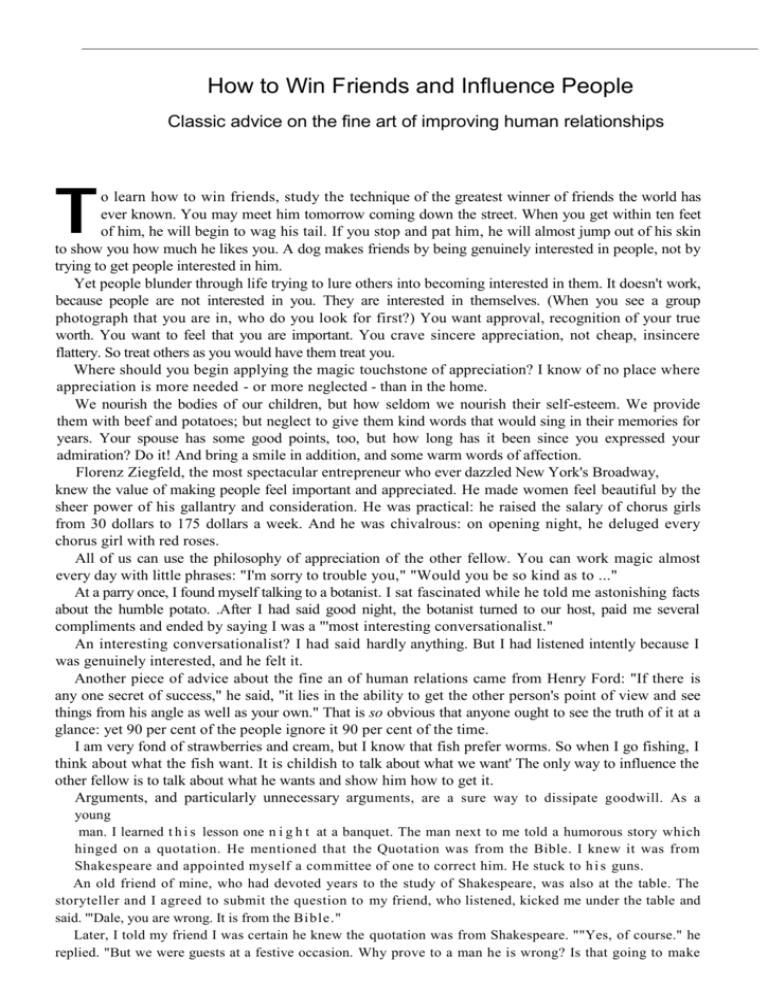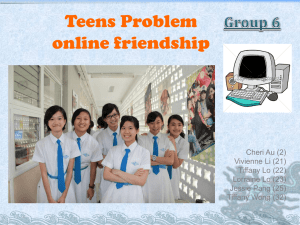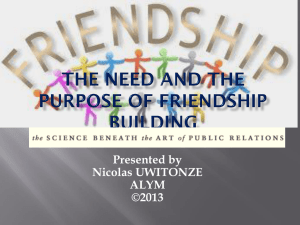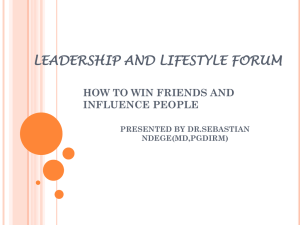How to Win Friends and Influence People
advertisement

How to Win Friends and Influence People Classic advice on the fine art of improving human relationships T o learn how to win friends, study the technique of the greatest winner of friends the world has ever known. You may meet him tomorrow coming down the street. When you get within ten feet of him, he will begin to wag his tail. If you stop and pat him, he will almost jump out of his skin to show you how much he likes you. A dog makes friends by being genuinely interested in people, not by trying to get people interested in him. Yet people blunder through life trying to lure others into becoming interested in them. It doesn't work, because people are not interested in you. They are interested in themselves. (When you see a group photograph that you are in, who do you look for first?) You want approval, recognition of your true worth. You want to feel that you are important. You crave sincere appreciation, not cheap, insincere flattery. So treat others as you would have them treat you. Where should you begin applying the magic touchstone of appreciation? I know of no place where appreciation is more needed - or more neglected - than in the home. We nourish the bodies of our children, but how seldom we nourish their self-esteem. We provide them with beef and potatoes; but neglect to give them kind words that would sing in their memories for years. Your spouse has some good points, too, but how long has it been since you expressed your admiration? Do it! And bring a smile in addition, and some warm words of affection. Florenz Ziegfeld, the most spectacular entrepreneur who ever dazzled New York's Broadway, knew the value of making people feel important and appreciated. He made women feel beautiful by the sheer power of his gallantry and consideration. He was practical: he raised the salary of chorus girls from 30 dollars to 175 dollars a week. And he was chivalrous: on opening night, he deluged every chorus girl with red roses. All of us can use the philosophy of appreciation of the other fellow. You can work magic almost every day with little phrases: "I'm sorry to trouble you," "Would you be so kind as to ..." At a parry once, I found myself talking to a botanist. I sat fascinated while he told me astonishing facts about the humble potato. .After I had said good night, the botanist turned to our host, paid me several compliments and ended by saying I was a "'most interesting conversationalist." An interesting conversationalist? I had said hardly anything. But I had listened intently because I was genuinely interested, and he felt it. Another piece of advice about the fine an of human relations came from Henry Ford: "If there is any one secret of success," he said, "it lies in the ability to get the other person's point of view and see things from his angle as well as your own." That is so obvious that anyone ought to see the truth of it at a glance: yet 90 per cent of the people ignore it 90 per cent of the time. I am very fond of strawberries and cream, but I know that fish prefer worms. So when I go fishing, I think about what the fish want. It is childish to talk about what we want' The only way to influence the other fellow is to talk about what he wants and show him how to get it. Arguments, and particularly unnecessary argu ments, are a sure way to dissipate goodwill. As a young man. I learned t h i s lesson one n i g h t at a banquet. The man next to me told a humorous story which hinged on a quotation. He mentioned that the Quotation was from the Bible. I knew it was from Shakespeare and appointed myself a committee of one to correct him. He stuck to h i s guns. An old friend of mine, who had devoted years to the study of Shakespeare, was also at the table. The storyteller and I agreed to submit the question to my friend, who listened, kicked me under the table and said. '"Dale, you are wrong. It is from the Bible." Later, I told my friend I was certain he knew the quotation was from Shakespeare. ""Yes, of course." he replied. "But we were guests at a festive occasion. Why prove to a man he is wrong? Is that going to make him like you'.'" Since then, having watched the effects of thousands of argument", I conclude that there is only one 'way to get the best of an argument: avoid it.Even if you win it, you lose it. Why? You may feel fine, but you have made the other man feel inferior, and he will resent you. In talking to people, begin by emphasizing the things on which you agree. Get the other person saying. "Yes." at the onset. Keep him, if possible, from saying "No." Socrates, "the gadfly of Athens." was one of the wisest persuaders who ever influenced this wrangling world. His technique was based upon getting: a "yes" response. He asked questions with which his opponent would have to agree. He kept on winning one admission after another until he had an armful of ‘yesses’. Finally, almost without realizing i t , his opponent found himself embracing a conclusion that lie would have denied b i t t e r l y a few minutes previously. ,The next time you are longing to tell a man he is wrong, remember Socrates and ask a gentle question one that will get the "yes" response. Perhaps the most fundamental lesson of all comes from Aesop's fable about the sun and the wind quarrelling over which one was the stronger. The wind said. "I'll prove I am. See that old man wearing a coat? I bet I can make him take his coal off quicker than you can." So the wind blew until it was almost a tornado, but the harder it blew, the tighter the o l d man wrapped his coat about him. Finally, the wind gave up, and the sun came from behind a cloud: and smiled kindly on the old man. Presently, he mopped his brow and pulled off his coat. The sun then told the wind that gentleness and friendliness are always stronger than fury and force. And so it is today. The sun can make you take off your coat more quickly than the wind: and kindliness, the friendly approach and appreciation can make people change their minds more readily than a l l the bluster and storming on earth. 'BYDALE CARNEGIE VOCABULARY crave (line 25) : have a strong desire or need for touchstone (line 30) : criterion for testing something dissipate (line LOO) : cause to go (/VIY/V hinged (line 103) : here: depended on a quotation for-its effect he stuck to h i s guns ( l i n e 108) : he refused to change his opinion What do you Know friendship? Friendship Social psychologists have defined friendship as 'a reciprocal attraction between persons, founded on the recognition of external or internal similarities'. Friendship can however be distinguished from merely liking someone (when the other person is 'sympathisch'): it can also be distinguished from love, because love is basically the attraction that is based on differences between persons, and on the way these differences can complement each other to form a whole. If a friendship is based solely on external similarities - that is, if two people are of the same race, colour, social background, or have the same hobbies, business interests, etc. - then it is a 'worldly' friendship: such a friendship can easily be broken when the external similarities change and disappear. Friendships of this type should more correctly be called by another name - comradeship, companionship, partnership, association and so on. When however a friendship is based on internal similarities (i.e. mental and spiritual ones) then it can be called a true friendship. This type of friendship recognizes no differences in birth or status, possessions or position: the external similarities are of secondary importance. It is of course true that the development of friendship is helped by external factors, and it is probably rare to find friends of totally different backgrounds and interests. Strangely enough - and in contrast to the position when one is 'in love' - friendship always holds some trace of egoism in itself. A lover sees and admires his opposite qualities in the person he loves: a friend sees and admires the reflection of himself in his friend. This is of course mainly an unconscious egoism, but in nearly all types of friendship it is there. We may admire the qualities of a friend that are similar to our own: or those that we do not possess, but wish that we did. A friend may even show weaknesses which we are (subconsciously) proud not to have: we like him in spite of, or even because of, these very faults! In some ways a friend can be our 'dream-ego': the person we admire and would like to be. Friendships break down when the people involved 'grow away' from each other, and become too different in interests, opinions, beliefs and character. Compare this with the situation often found within a marriage. What begins with love - recognition of opposite qualities - can over the years turn to a deep friendship, as the differences and inequalities become evened out and the two people become more similar in their 'internal' life. Vocabulary reciprocal (para 1): given and received in return similarities (para 1): likenesses be distinguished ipara 2): be different unconscious (para 5): being unaware faults (para 5V something that makes a person impperfect FRIENDSHIP Friends play an important part in our lives and although we may take the fact of friendship for granted, we often don't clearly understand how we make friends. While we get on well with a number of people, we are usually friends with only a few — for example, the average among students is about 6 per person. Moreover, a great many relationship come under the term «friendship». In all cases, two people like one another and enjoy being together, but beyond that, the degrees of intimacy between them and the reasons for their mutual interest vary enormously. Initially, much depends on how people meet and on favourable first impressions. As we got to know people, we take into account things like age, race, physical attractiveness, economic and social status, and intelligence. Although these factors are not of prime importance, it is more difficult to relate to people when there is a marked difference in age and background. On a more immediate level, we are sensitive to actual behaviour, facial expression, and tone of voice. Friends will stand closer together and will spend more time looking at each other than mere acquaintances. Smiles and soft '.voices also express friendliness. A friendly look with the wrong facial expression can turn into an aggressive stare and nervousness may be misread as hostility. People who do not look, one in the eyes arc mistrusted when in fact, they simply lack confidence. It is usual for close friends to have similar ideas and beliefs, to have attitudes and interests in common — they often talk about being on the same wavelength. It generally takes time to reach this point, sometimes people «click» immediately. The more intimately involved people become, the more they rely on one another. People want to do friends favours and hate to let them down. In contrast with marriage there are no friendship ceremonies, no ritual to strengthen the association between two people. But the experiences and emotions do create a powerful bond, which can overcome difficulties in background, and break down barriers of age, class or race. IX. JJod6epume pyccKue SKeuacuieHmbi K CAedytoiu,UM nozoOOpKOM U nOCJlO6UU,OM. A friend in need is a friend indeed. When a friend asks, there is no tomorrow. Friends are thieves of time. A man is judged by his foes as well as by his friends. 208





